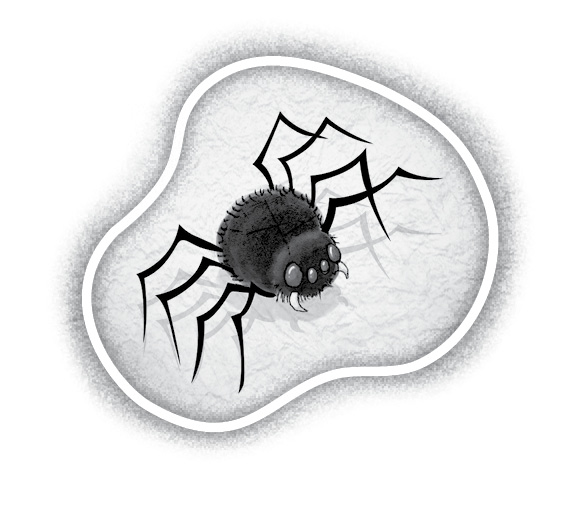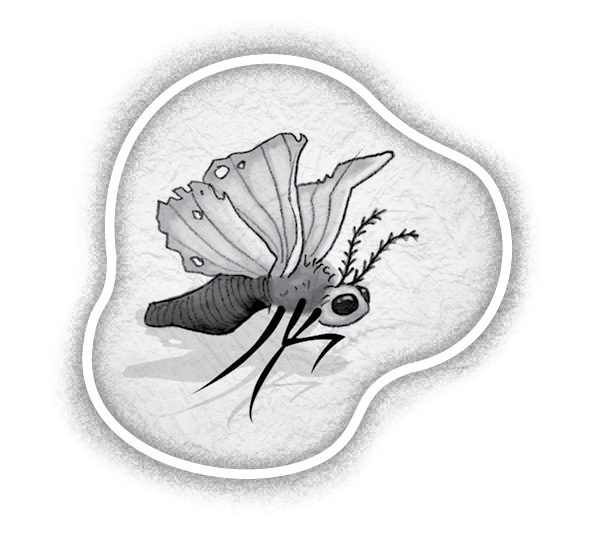The Ogre of Oglefort (16 page)
Read The Ogre of Oglefort Online
Authors: Eva Ibbotson

26
RETURN OF THE GHOSTS

T
he ghosts were back in their train, going around and around in an everlasting circle. They had been promised that if they frightened the ogre to death, their train would be rerouted: they would go on branch lines, through junctions, into different tunnelsâbut they had failed and now they were doomed once again to travel on the same wearying line.
The Ghost with the Umbrella had lost a leg. Ghosts don't feel pain, but it was inconvenient and he had to use his umbrella as a crutch. The Honker's seat was empty, and the dark place where the Inspector used to hover was gone.
Their failure weighed heavily upon the remaining ghosts. They were doomed to go around and around forever. There was nothing to be done.
But in their cave, the Norns now woke.
They didn't wake very much; they were too far gone, but they woke as much as they could, and gradually they remembered what had happened.
They had sent the ghosts to frighten the ogre to death.
“Screen!” screeched the First Norn.
And, “Screen! Screen!” croaked the Second and Third Norns.
So the magic screen was brought and the Norns peered into it. They were so exhausted they could only just make out the pictures.
First the castle . . . then the castle courtyard and a strange sort of carriage waiting to cross the drawbridge. The carriage was closed and painted black with a white skull on the side, and the words:
HERE LIES DENNIS OF OGLEFORT. REST IN PEACE.
“A hearse!” cried the First Norn.
“A funeral hearse,” said the Second Norn.
“Going to the graveyard,” said the Third.
They blinked excitedly at each other.
“Ogre dead!” said the First Norn.
“Ogre finished,” said the Second Norn.
“Being buried,” said the Third Norn.
They went on peering at the screen as the hearse lumbered away across the drawbridge, carrying the remains of the wicked monster to his grave.
“Princess free?” wondered the First Norn.
“Saved?” said the Second Norn.
“Back home?” wondered the Third.
They peered at the screen again and the picture changed . . . flickered . . . and then stopped in a walled garden with beautiful flowers and grass. The Princess Mirella was bending very carefully over a deep red rose, smelling the blossom just as a princess should. Her hair was combed and she looked very happy.
The Norns smiled. They didn't often smile, and the effort cracked the sides of their mouths but it didn't matter. The princess was safe, all was well, and they could sleepânot just for weeks or for months, but for years and years and years.
Their eyes were closing when they remembered the ghosts. They had not given them their reward for killing the ogre. With a great effort they got back on their knees and waved their withered arms.
And in the train, the specters sat up and gasped with amazement. The train had reached one of their usual stations on the dreary circle line, but it did not go on to the next station, and the next, around and around and around.
No, it took off on a completely different route. It went whizzing off on a branch line that they had never seen, and then a junction, before it changed direction once again. New stations, new junctions, new tunnelsâeven a viaductâunfolded before the specters' amazed eyes, as they were rewarded for something they had definitely not done.
“Perhaps we should become better ghosts?” suggested the Man with the Umbrella. “Less beastly and so on.”
But no one thought this was a good idea.
“We're used to being horrible and vile,” said the Aunt Pusher. “Anything else would unsettle us.” And they went on staring at this new world that had unfolded before their evil eyes.
But the Norns by now were fast asleep, and as they slept the floor of the cave sank slowly down and down, ever deeper into the Underworld, and the nurses and the harpies sank down with them, because their work was doneâand in Aldington Crescent underground station, all was silence and all was peace.
27
GLADYS AGAIN

G
ood heavens,” said Mirella, looking out of the kitchen window. “Who on earth is that?”
A man in a gray business suit was coming slowly over the drawbridge, looking about him nervously.
Ivo stared. “I think it's Mr. Prendergast,” he said, “the Hag's lodger in London,” and ran out to meet him.
Ivo was right. Without a single magic bone in his body, and without the help of the Norns, Mr. Prendergast had managed to make his way to Oglefort because he had something he wanted to give the Hag. It was a wooden box, and when the Hag opened it, she found a very small urn filled with ashes.
“It's Gladys,” said Mr. Prendergast simply. “She passed away peacefully in her sleep, so I had her cremated, and I thought she would like to come to you.”
Everyone was very touched, and the children suggested there should be a proper ceremony and a scattering of the ashes, perhaps near Germania's mound, for company. But the Hag shook her head.
“We began together in a Dribble, Gladys and I,” she said, looking down at the little urn in her hand, “and she shall end in one.”
So that afternoon she went alone with her toad to her favorite place in the world, and sat on the stone in the middle of the marsh, and though she was sad, her sadness was mixed with reliefâbecause she could now forgive Gladys completely for having said she was too tired to come to the meeting. Gladys must have been much nearer the end of her life than the Hag had realized, and had every right to be tired. And really nothing but good had come out of it all because they had found Ivo, and there couldn't be anything better in the world than that.
Mr. Prendergast had brought news, too, about the wizard's mother. Mrs. Brainsweller had got a very important job, organizing all the Banshee choirs which went to wail at places where something bad had happened. This meant traveling all over the country and she had decided to leave her son to get on with his own life.
“I did my best for him,” she had told Mr. Prendergast. “But he was never properly gratefulâand really when I saw him making a
salad
I realized I was just wasting my time.”
This news was a tremendous relief to the wizard, and to the two spiders who had been watching over him, and that night he cooked a wonderful festive meal for everyone, using produce from the garden, and they drank to Gladys's memory and toasted “absent friends.”
When it was clear that the aunts were gone for good, the ogre had asked the troll to take care of the castle till he returned, but this time Ulf had been firm.
“We'll stay but only if you leave the castle to us when you go and join Germania in her mound. We have the children's future to think of.”
The ogre had agreed and sent for a lawyer to make a proper will. He had also left them his sock drawer so there was money to run things properly, and gradually more people came to the castle, not to be changed into animals but to work and to help. Brod sold them a cow and some chickens, and his little grandson came up whenever he could to lend a hand. Mr. Prendergast was so sad at the thought of making the dangerous journey back and living alone in Whipple Road that he decided to stay. He did the accounts and was useful in all sorts of ways, and the Hag wrote a letter to the principal of the children's home saying that Ivo was safe and well, and the orphanage could have her house and sell it and keep the money. She was sure that this would keep the principal quiet and she was quite right.
They had postcards from the ogre quite often; he was really enjoying life on board the
Empress of the Seas
. He had turned out to be the best at shuffleboard and won a prize at bingo, and the captain had invited him to sit at his table.
“I don't think the fingernail boat would have suited me nearly so well,” he wrote.
There was some talk about starting a school, but the children thought this was a bad idea.
“Anyone who can read and write and add and subtract can educate themselves,” said Ivo firmlyâand somehow the talk died down.
The Norns were mistaken when they looked into the screen and thought that Mirella was smelling a rose. She had in fact been settling the spittlebug she'd taken from the ogre's nose into the center of the flower, which was damp and quiet and suitable.
“I don't think the other passengers would like it if you had insects coming out of your nose all the time,” she had told him. “And you know I'll look after them.”
Which she did, most faithfully. Everyone was careful not to make the garden too tidy and to leave heaps of compost and a few stones, and some leaf mold so that there was always somewhere for the wood lice and bugs to go, and it became a sanctuary for everything that crawled and buzzed and flew.
“Oh we are lucky to be able to grow up here,” said Mirella.
“To live here forever if we want to,” said Ivo.
They were in the garden on a lovely autumn afternoon. The gnu grazed peacefully nearby; the aye-aye was sitting on the roof of the greenhouse, peeling a cob of sweet corn they had brought her; they could hear Bessie splashing in the lake.
And on a sunlit patch of grass sat Clarence on his trolley. The aunts had not come back for him and he was part of the family now. Charlie, as always, was guarding him, and from time to time he carefully licked the mottled shell. Clarence was obviously going to take his time to hatch, and whether he was going to be someone who would save the world or just an outsize chicken nobody knew, but the children were not in a hurry.
Anyone who has an egg to watch over has a stake in the future, and the futureâthey were sure of itâwas going to be
good
.